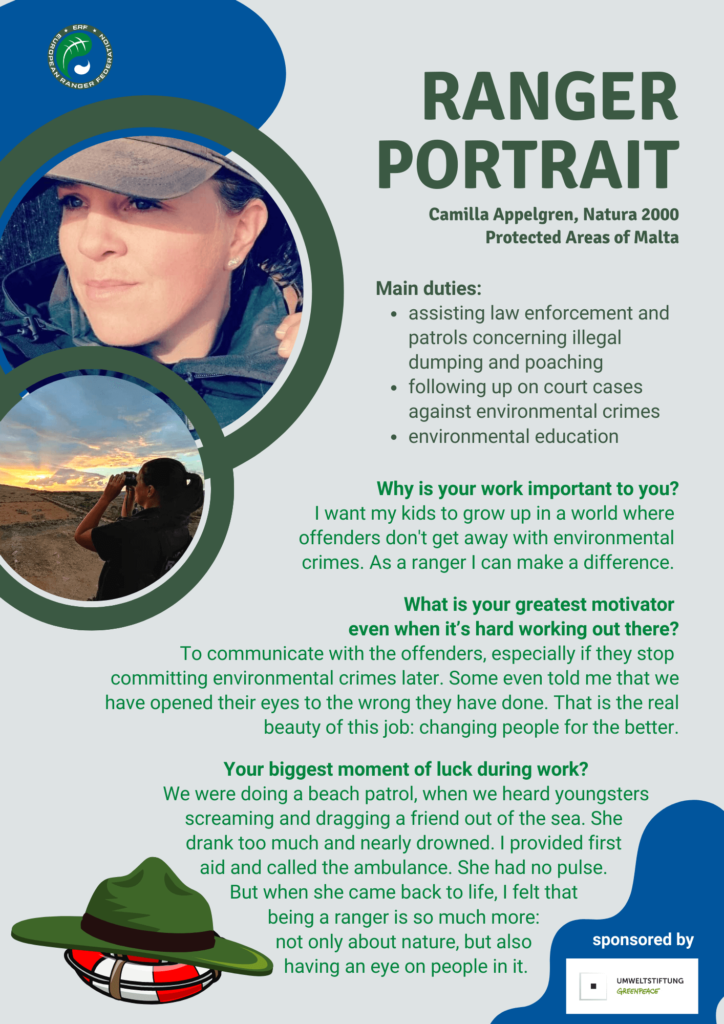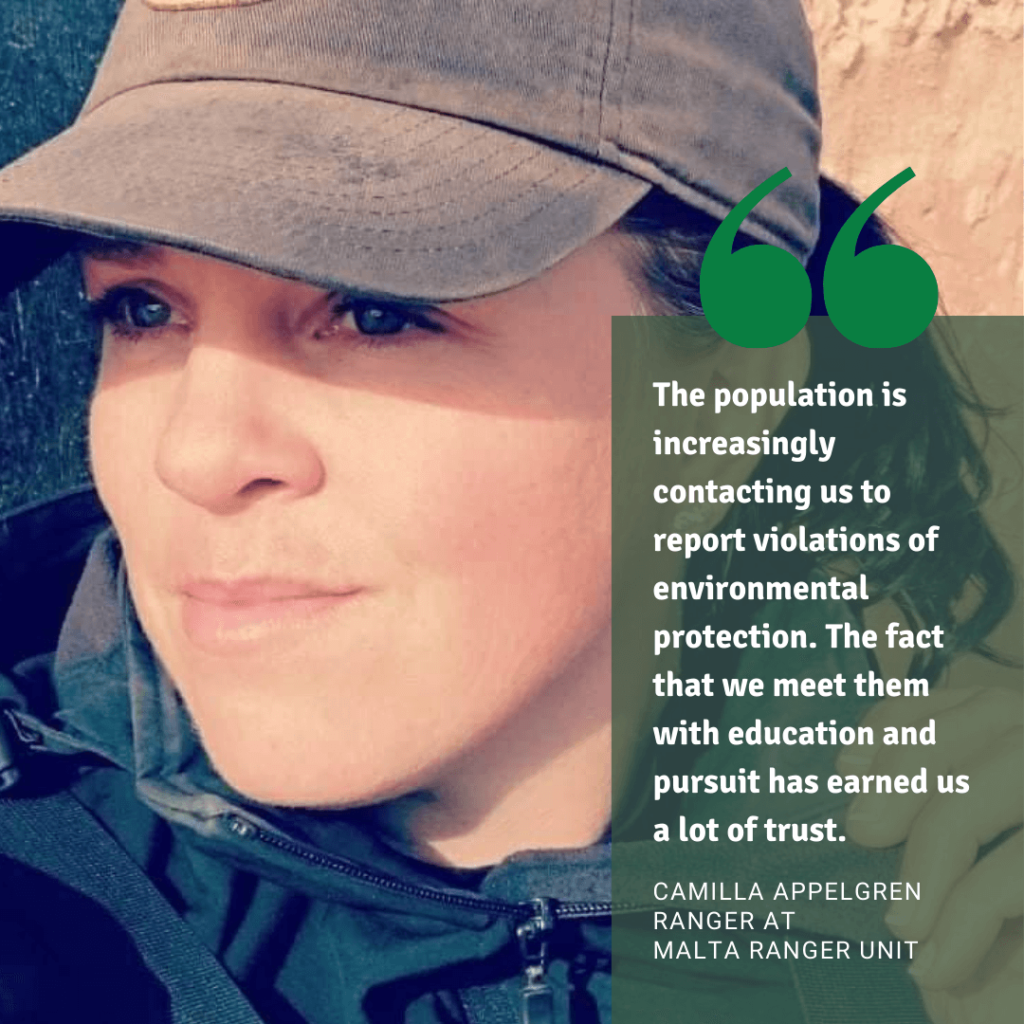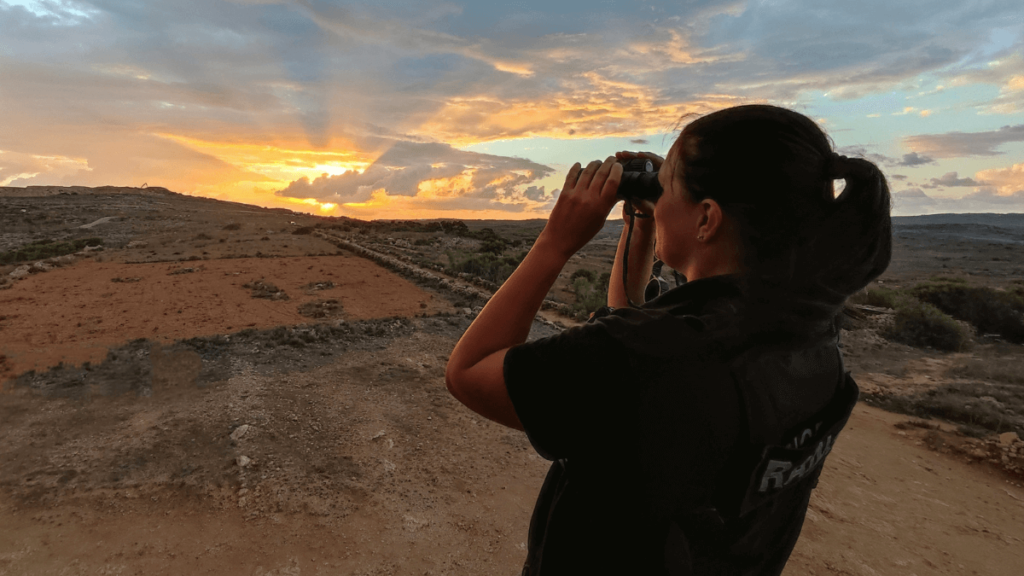Thinking of Malta, many will remember the case of Daphne Caruana Galizia, the journalist who died in 2017 due to a bomb hidden in the car she drove. Not only journalists, also rangers live in danger in Malta, as Camilla Appelgren from Malta Ranger Unit says – one of our newest members. Here she reports about what it means to work as a ranger in Malta and why networking in the international ranger community is so important for establishing ranger work there.
According to Appelgren, in Europe’s smallest country and thus “a country where everyone knows each other” ranger work can be very up, close and personal. By prosecuting environmental crimes, rangers quickly step on the toes of people with whom the same ranger can meet in daily life at a grocery store or coffee shop. Also in some cases, she says, due to the very same context it would not be far fetched to state that individuals may have also enjoyed impunity through powerful contacts or else by threatening politicians with their votes. After working for ten years as an environmental activist, this is something Camilla is experienced in.
The first patrolling ranger unit in Malta: a private initiative
“I organised cleanups and tried to educate the population about pollution of air, water and many more”, she reports. As a ranger she now patrols mainly so that such cleanups are no longer necessary: “As I got a role as park ranger I built up the first patrolling ranger unit in Malta. We are mainly monitoring the Natura 2000 protected areas in Malta for environmental crimes like waste dumping – or fly tipping, as we call it –, illegal fishing, illegal hunting and illegal fires.”

Threats, physical or online, such as Caruana Galizia has received, reach Camilla and her colleagues mainly from the poaching scene. “We have court cases going on about those threats.” Poaching, she says, is a big issue in Malta, whether it is illegal hunting of game outside of the hunting season or poaching to sell wildlife products abroad. “There are about 10.000 hunters in Malta and we are one of the few countries with spring hunting – although the EU tries to push forward a ban currently.” So with just over half a million inhabitants and hunting season technically lasting 10 months per year, much remains to be done for conservationists and rangers in Malta.
Malta Ranger Unit: set up to uncover and prosecute crimes against environmental laws
Originally from Sweden, Appelgren worked as a ranger in the national park in Malta after her years in environmental activism. Along the way, she set up her own NGO, funded by private entrepreneurs from inside and outside of Malta and in future open to anyone with a membership. Now working full time for her NGO and soon joined by her ranger colleague, her goal is to continue working and building up staff to uncover and prosecute crimes against environmental laws. Because rangering in Malta also means doing what the police cannot do: “We get tips from the public or learn from our own observation about ongoing cases and do the work that might be hard for the police to do, e. g. lying in ambush for hours to reveal fly-tipping. So I think one of the rangers’ role in Malta is to fill in these gaps”, Appelgren says.
“Malta’s environmental laws are good – if they were implemented.”
Camilla Appelgren, Ranger at Malta Ranger Unit
“The biggest task for rangers: staying safe“
She became a ranger because of her experience from environmental activism, knowledge of the island and its nature. “Sometimes this is even better than an academic background. I’ve been on the ground and seen what’s going on. Of course, I try to balance my academic part, but at the moment we are too overloaded with cases to keep at it”, she states. Yet she is convinced that Malta’s environmental laws are good – if they were implemented.
Filing reports, following up on them to make sure things are done in the right way by the authorities, ensuring that evidence is bulletproof – this is what she lists as duties in everyday ranger life. “The biggest task, however, is that we remain safe, because the biggest problem we have due to corruption is impunity. A lot of offenders feel above the law and have powerful contacts.”
As rangers are civilians in Malta, Camilla and her colleague focus on collecting evidence and rely on police and other authorities to prosecute the offences. “Some crimes we can document well, such as fly-tipping, where we can record the offenders and gather enough evidence, we can simply file a police report. In cases like poaching, where the offenders are armed and the situation is more unsafe for us, the police have to come on site and catch people in the act”, she explains the cooperation. A cooperation that does not work everywhere, however: “Malta consists of two islands: the mainland and Gozo. In Gozo we have no environmental police at all and cannot rely on anyone. We can only contact the district police, who are not at all familiar with the environmental laws.”

Population increasingly cooperates even with minor environmental crimes
But there are alliances that work well: Malta Ranger Unit works alongside with other NGOs like BirdLife Malta or Committee Against Bird Slaughter against poaching – from crime to crime, all year round. “We are also hoping to work with rangers from other countries once the Malta Ranger Unit is all set up to have exchange programs as a great learning experience”, Appelgren adds. “This is also why we joined the European Ranger Federation.” With the pooling of forces and exchange, she is sure that ranger work will receive more attention, further funding and trust from the public.
Camilla and her colleagues push all this with the aim of protecting Malta’s terrestrial and migratory species first. And then, with more resources for boats, further equipment and personnel, to watch over the marine species as well. Camilla Appelgren has reason to hope that support for her plans will grow: “The population is increasingly contacting us to report even small violations of environmental protection. Such things have not been taken care of for a long time. The fact that we pursue these things with a mixture of environmental education and consistent prosecution has earned us already a lot of trust.”
This content is sponsored by


